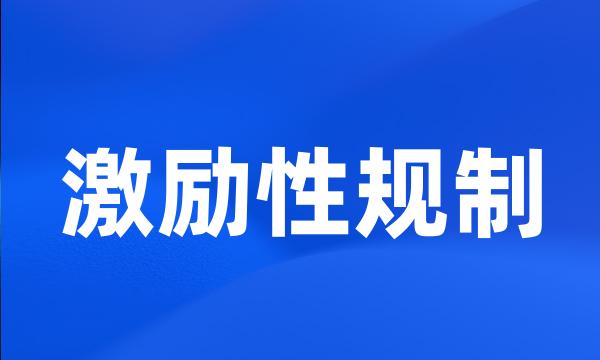激励性规制
- 网络incentive regulation
 激励性规制
激励性规制-
激励性规制由此被引入传统自然垄断产业。
Incentive regulation is implied to the traditional monopoly industries .
-
激励性规制在电信产业中的应用分析
Analysis of the Incentive Regulation in the Telecommunication Industry
-
放松规制和激励性规制是微观规制的发展趋势。
Relaxed regulation and encouraging regulation are the future trend of the regulation .
-
内生信息结构下的激励性规制理论研究
Incentive Regulation Theory under the Endogenous Information Structure
-
激励性规制视角下的土地一级开发政策的比较研究
Comparison of First-Development Policies from Stimulant Regulation
-
第二,建立动态内生信息结构下的激励性规制模型。
In the second part the dynamic models under endogenous information structure are set up .
-
西方激励性规制理论评述
Review of the incentive theory of regulation
-
激励性规制的强度分析
Analysis of Intensity of Incentive Regulation
-
作为一种激励性规制手段,适当的支付方式可以激励医疗服务提供者降低医疗服务价格,最小化机会主义行为。
As a method of incentive regulation , properly payment method could cause provider reduce the cost .
-
激励性规制理论与实践及对我国电力产业改革的启示
On the Theory and Practice of Incentive Regulation and It Inspiration for the Reform Electricity in China
-
规制方法改革是指以激励性规制取代传统规制,为企业效率提高提供激励。
The technical methods of regulation mean to replace the traditional regulation of incentive regulation , to provide incentives for enterprise efficiency .
-
激励性规制能够促使企业降低成本、提高效率,但激励性规制并非完美。
The author thinks that the incentive regulation can help to reduce cost and raise efficiency , but it is not perfect .
-
介绍了本文有关的理论基础,包括:垄断商品定价、激励性规制理论、成本性态理论。
This paper describes the theoretical basis , including : monopoly commodity pricing , incentive regulation theory and the cost of state theory .
-
进一步讲,在理论上要有公共利益规制理论、放松规制理论和激励性规制理论三个理论要求。
Further speak , in theory must have the public interest regulation theory , deregulating theory and incentive regulation theory three theory demands .
-
公共利益理论、公共选择理论、规制俘虏理论、激励性规制理论等都只能对出租车市场的局部现象做出合理解释。
Public interest theory , public choice theory , regulatory capture theory , incentive regulation theory can only explain partial phenomena of taxi market .
-
20世纪80年代后期激励性规制模式被引入到电力产业中,并在很多国家的应用中取得了成功。
Mode of incentive regulation was introduced into electricity industry in the later of 1980s , which also has been applied successfully in many countries .
-
激励性规制理论是委托-代理理论、制度设计理论、信息经济学与规制理论研究相结合的成果。
The theory of incentive regulation is the outcome of the incorporation of the principal-agent theory and mechanism design theory and information economics into regulatory economics .
-
以激励性规制引导电信竞争,为电信产业的持续发展营造良好的市场规则与产业环境。
The authors argue that the government should direct the telecommunication industry with incentive regulation and construct a favorable market rule and circumstance for the sustaining development .
-
激励性规制既有降低成本、提高效率的优点,同时又存在降低质量、规制俘获和规制剥夺等问题。
Incentive regulation has advantages of decreasing cost and improving efficiency , however , it has some negative effects such as decreasing quality , regulative capturing and depriving .
-
有介于此,本文运用激励性规制理论、机制设计理论、拍卖理论等,设计一套激励性竞价机制。
Therefore , in order to resolve this problem , this paper designed a new incentive bidding mechanism with the theories of incentive regulation , mechanism designing , bidding etc.
-
本论文放松了现有激励性规制理论中信息结构外生给定的假设,研究内生信息结构下的最优激励性规制问题。
This dissertation relaxes the assumption of exogenous information structure in the existing theory of incentive regulation and tries to studies the problem of optimal regulation under endogenous information structure .
-
二是规制内容体系的完善,重点是要建立包括激励性规制、不对称规制、反垄断规制与社会性规制在内的四位一体的规制体系。
Second is completing the content system , with the key of building quaternity , that is , incentive regulation , asymmetric regulation , anti trust regulation and social regulation .
-
激励性规制强化供电企业运营绩效时,需同时加强对供电质量和供电可靠性的规制。
When the incentive regulation is used to strengthen the performance of the electricity distribution utilities , the regulation of power quality and supply reliability must be reinforced at the same time .
-
摘要激励性规制理论是建立在规制双方信息不对称和行为目标差异基础之上的,是委托-代理理论、机制设计理论在政府规制领域的应用。
The incentive regulation theory is formed on the basis of information asymmetry and differences of behavioral objectives , which is the application of principal-agency theory and mechanism design theory in governmental regulation field .
-
论文在梳理自然垄断、政府规制及相关理论变迁的基础上,通过对规制失灵和激励性规制等问题的分析,探讨了民航业规制改革的必要性。
On the basis of analyzing the nature monopoly , government rules and regulation and transitional theories related , the paper has discussed the necessity of the rules & regulations reform in civil aviation industry .
-
激励性规制给予企业一定的价格制定权,让其利用信息优势和利润最大化动机,主动提高内部效率、降低成本,并获取由此带来的利润增额。
Stimulant Regulation gives companies some privilege of pricing , and let them use information predominance and motivation of maximizing benefit to improve efficiency and reduce cost in initiative , as to get more benefit .
-
西方国家在自然垄断产业的规制实践中,采用了多种多样的激励性规制形式,如价格上限规制、社会契约制度、特许投标规制、标尺竞争规制等。
In the regulation practice of natural monopoly industry , the western countries have adopted various incentive regulation forms , such as price cap regulation , social contract system , franchise bidding regulation and yardstick competition regulation .
-
在产业政策方面,要建立合理的水价形成和监管机制,实行激励性规制,改革投资体制,拓宽投资领域。
At the same time , policies should be made to facilitate the formation of a more reasonable system of pricing and supervision , incentive system should be established , and ultimately investment system should be reformed .
-
基础设施领域可通过增加生产者数量、实行激励性规制、利用潜在进入者和替代产品的威胁等多种方式引入竞争机制。
Competition mechanism can be injected into infrastructure industries in direct or indirect ways , such as increasing the quantity of productions , putting the urgent rules and utilizing the threatening of the potential competitor and the substitute products .
-
激励性规制方法通过引入竞争和产权结构调整来提高规制效率和规制质量,克服了传统规制行政命令和控制所带来的问题。
The method of incentive regulation makes use of introduction of competition and the restructuring of property rights , to improve the efficiency of regulation and regulatory quality and overcome executive orders of the traditional regulation and control issues arising .
